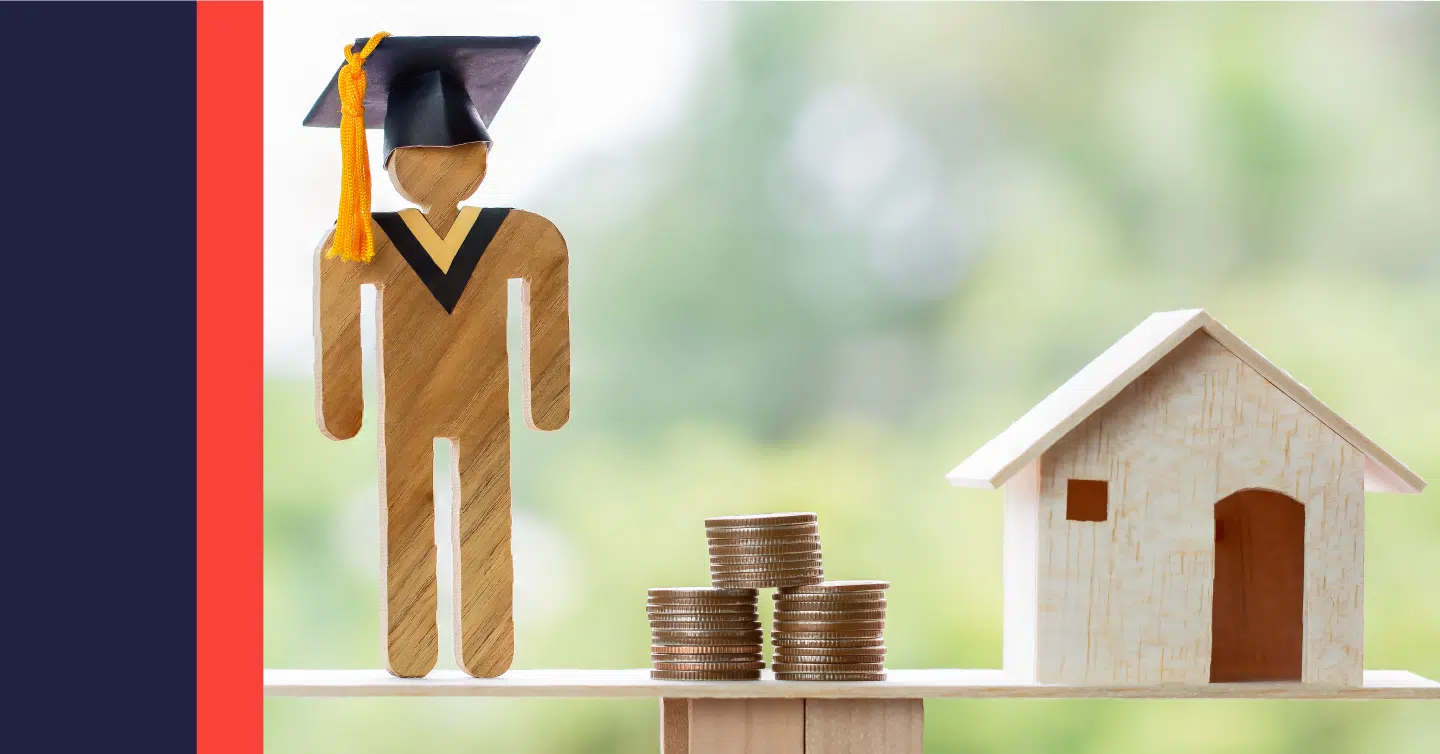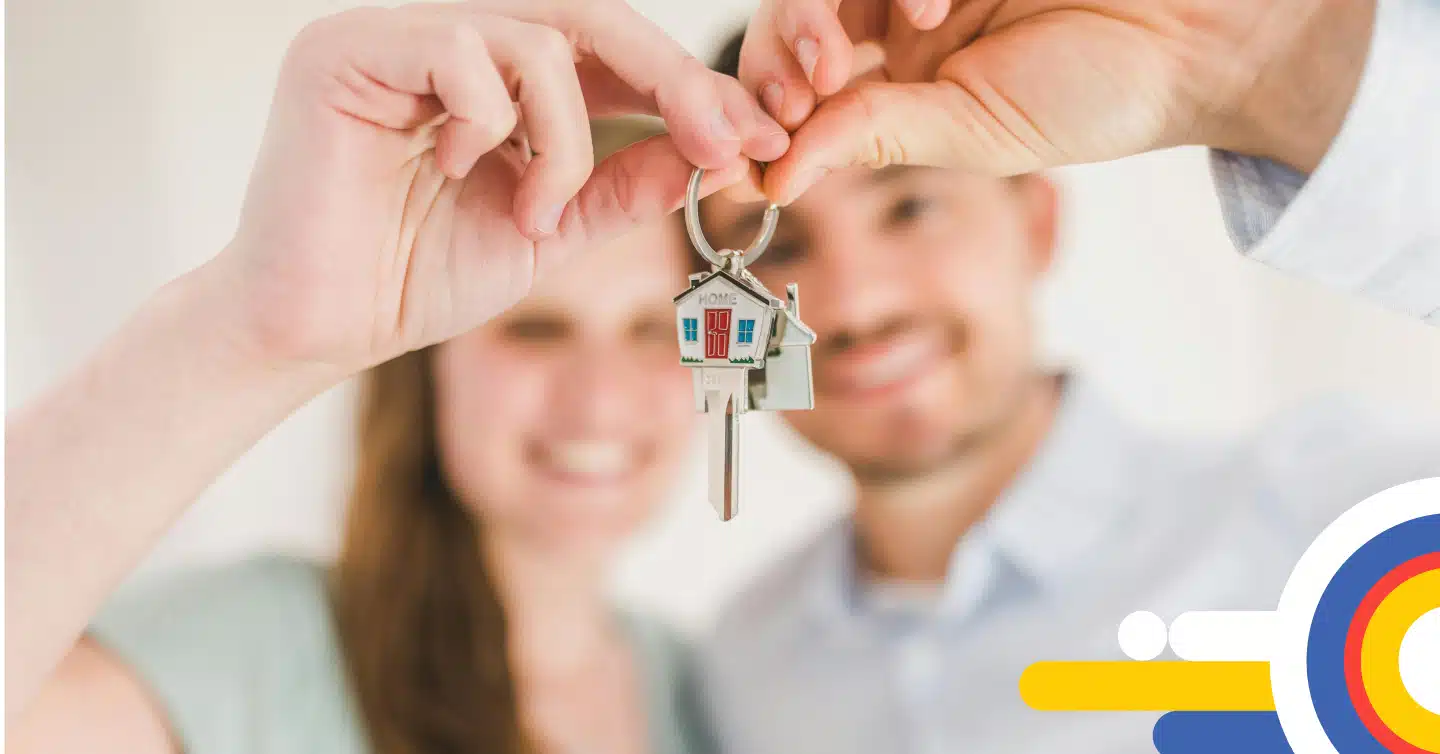Should You Pay Off Student Debt or Get a Mortgage First?

Table of contents
It’s a common financial fork in the road for many Canadians: Should you pay off your student debt first or start saving for a mortgage and enter the housing market? With rising home prices, interest rate volatility, and the weight of student loans on your credit profile, the decision isn’t always clear-cut. The answer ultimately comes down to how lenders evaluate your debt load and whether you have sufficient finances to support both.
Key Takeaways
- Carrying student debt doesn’t automatically disqualify you from a mortgage, but it can lower your borrowing capacity.
- Prioritizing homeownership may be a smart move if you expect home prices to rise faster than your loan’s interest rate.
- Making repayments on your student loans while saving for a down payment can help you qualify for a home sooner without neglecting your debt.
How Lenders View Student Debt
Lenders use two important ratios to assess your ability to take on a mortgage: Gross Debt Service (GDS) and Total Debt Service (TDS). These ratios examine the proportion of your monthly income allocated to housing costs and all other debts, including student loans and other financial obligations. The more debt you carry, the smaller the mortgage you’ll likely qualify for.
Whether you’re still in your grace period or actively making repayments, lenders will typically assign a percentage of your loan balance as a monthly payment obligation if no payments are shown on your credit report.
Depending on the lender and the type of student loan, this may be the actual amount of the future payment or a percentage, often 3%, for student lines of credit. If the balance exceeds $50,000, it may be amortized over 25 years, based on the higher of the federal minimum qualifying rate (MQR) or the interest rate.
How Student Debt Impacts Mortgage Affordability
Even if your student loan payments seem manageable, it can significantly reduce the size of the mortgage you’re approved for. The more fixed payments you already owe each month, the more limited your borrowing capacity. Even a small monthly payment can ultimately reduce your borrowing power by tens of thousands of dollars, which can be a big deal in today’s housing market.
Let’s say you earn $70,000 annually and pay $500 monthly toward student loans. That $500 gets factored into your TDS ratio. Lenders may either reduce the mortgage size they will approve so you fit within the qualifying guidelines. They may also deny the application if your total debt service ratio exceeds the qualifying threshold.
Benefits of Paying Down Student Loans First
For many borrowers, the thought of taking on a mortgage while still carrying student debts may be uncomfortable. You may feel more confident entering the housing market with fewer debt obligations. In that case, knocking out student debt could be a top priority.
This option may be best suited for those with high-interest loans or large repayments that affect their affordability. Paying down your student loans first can help:
- Improve your credit score: As you make payments on your student loan, this becomes part of your payment history, one of the key factors considered when calculating your credit score. Making timely payments can boost your credit score and help you secure better mortgage rates and terms.
- Lower monthly obligations: Removing a fixed debt payment improves your Total Debt Service (TDS) ratio, which increases your borrowing capacity.
- Provide peace of mind: Buying a home with less debt can reduce financial anxiety and give you more flexibility in your monthly budget, especially if your financial situation changes or a significant expense arises after purchasing a home.
Benefits of Buying a Home While Still Paying Off Loans
Despite the appeal of lowering debts or being debt-free, there are compelling arguments for entering the housing market, even with student loans still outstanding. For many, delaying a home purchase to pay down debt means missing out on valuable equity gains.
Delaying a home purchase to pay off debts could also leave borrowers priced out of some markets, especially in urban centres where home prices continue to rise. If you can qualify with student loan payments, have a stable income, and have the down payment ready, getting into the housing market earlier could put you ahead financially, even if it means delaying your debt-free status.
- Start building equity: Instead of paying rent, you begin building equity that can grow over time. This equity can be leveraged later through a refinance to consolidate debt into a single, lower-rate mortgage payment or for any other purpose.
- Outpace inflation: Home prices in many markets increase faster than the interest due on student loans, especially if your loan is a low-interest government one.
- Take advantage of price dips: Buying while prices are temporarily down, even with student debt, could give you more time to grow your home equity when the market rebounds.
- Start sooner on mortgage amortization: The earlier you begin with a mortgage, the sooner you’ll be mortgage-free, even if that means starting with a smaller property or co-ownership model.
What to Consider When Making a Decision
While there is no one-size-fits-all answer, several key considerations can help inform your decision and strategy. These include not only your finances but also your lifestyle goals and risk tolerance. If you’re still undecided, consider obtaining a mortgage pre-approval or pre-qualification to determine your current borrowing power. It can help you see whether now is the right time or if you should hold off.
- Interest rates: Compare your student loan interest with current mortgage rates. If your loans have a low interest rate, prioritizing homeownership may yield better returns compared to paying off your loans.
- Housing market trends: Are prices climbing quickly in your city? If so, waiting could ultimately cost you more.
- Job security: A stable income improves both your mortgage application and your ability to manage monthly payments.
- Use of incentives: Programs like the FHSA and RRSP HBP can help you build a down payment while offsetting taxes with your contributions.
Frequently Asked Questions (FAQ) About Being Student Debt Free vs. Getting a Mortgage
Can I qualify for a mortgage if I still have student loans?
You can qualify for a mortgage with student loans as long as you have the income to support repaying both the mortgage and your student loans. Lenders will look at your income and how much of it goes toward monthly debts to determine how much mortgage you can afford.
Is it better to pay off debt before buying a home?
It may be better to pay off debts before buying a home if those debts have high interest rates or significantly impact your debt-to-income ratios, making it harder to qualify. If you have low-interest debts, you might benefit more by continuing to make repayments as long as your income supports both repayments and allows you to qualify for the mortgage to enter the housing market.
Can I use my First Home Savings Account (FHSA) to pay off student loans?
While you technically can use the FHSA to pay off your student loans, it’s not recommended. You will be required to report the amount withdrawn as income on your income tax return if the amount is not used to purchase your first home. It will also be subject to taxes based on your tax bracket for the year the amount was withdrawn.
The FHSA is designed to provide tax advantages to help first-time buyers save for a down payment. Using it for any purpose other than a home purchase will make the amount withdrawn taxable income, eliminating the tax advantages of the account. However, you can use your FHSA contributions to receive a tax refund, which can then be put toward paying down your student loan more quickly.
Final Thoughts
There’s no universally correct answer when it comes to choosing between paying off student loans or buying a home. It’s all about what works best for each individual based on income, debt load, personal goals, and the local housing market. Lenders are used to seeing student debt on mortgage applications, and it’s entirely possible to qualify for a home while managing your loan repayments if you have the income and down payment to support both.A nesto mortgage expert can help you assess affordability and build a mortgage strategy that fits your long-term financial picture, whether you’re still repaying student loans or ready to become a homeowner today.
Why Choose nesto
At nesto, our commission-free mortgage experts, certified in multiple provinces, provide exceptional advice and service that exceeds industry standards. Our mortgage experts are non-commissioned, salaried employees who provide impartial guidance on mortgage options tailored to your needs and are evaluated based on client satisfaction and advice quality. nesto aims to transform the mortgage industry by providing honest advice and competitive rates using a 100% fully digital, transparent, seamless process.
nesto is on a mission to offer a positive, empowering and transparent property financing experience – simplified from start to finish.
Contact our licensed and knowledgeable mortgage experts to find your best mortgage rate in Canada.
Ready to get started?
In just a few clicks, you can see our current rates. Then apply for your mortgage online in minutes!















